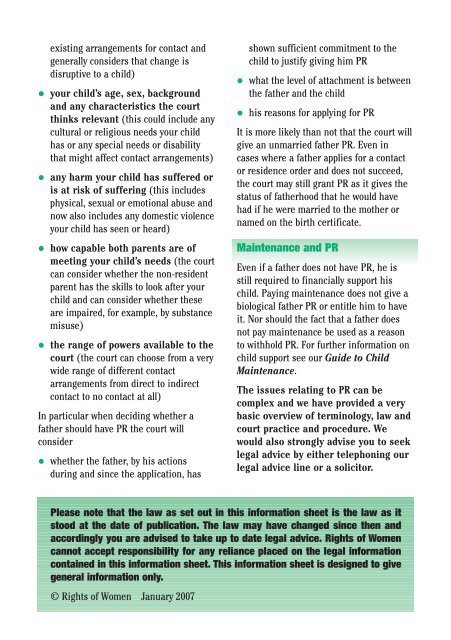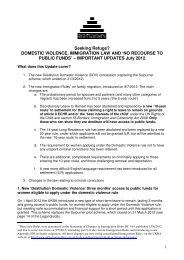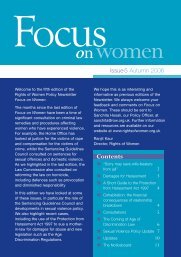Parental Responsibility - Rights of Women
Parental Responsibility - Rights of Women
Parental Responsibility - Rights of Women
Create successful ePaper yourself
Turn your PDF publications into a flip-book with our unique Google optimized e-Paper software.
existing arrangements for contact and<br />
generally considers that change is<br />
disruptive to a child)<br />
your child’s age, sex, background<br />
and any characteristics the court<br />
thinks relevant (this could include any<br />
cultural or religious needs your child<br />
has or any special needs or disability<br />
that might affect contact arrangements)<br />
any harm your child has suffered or<br />
is at risk <strong>of</strong> suffering (this includes<br />
physical, sexual or emotional abuse and<br />
now also includes any domestic violence<br />
your child has seen or heard)<br />
how capable both parents are <strong>of</strong><br />
meeting your child’s needs (the court<br />
can consider whether the non-resident<br />
parent has the skills to look after your<br />
child and can consider whether these<br />
are impaired, for example, by substance<br />
misuse)<br />
the range <strong>of</strong> powers available to the<br />
court (the court can choose from a very<br />
wide range <strong>of</strong> different contact<br />
arrangements from direct to indirect<br />
contact to no contact at all)<br />
In particular when deciding whether a<br />
father should have PR the court will<br />
consider<br />
whether the father, by his actions<br />
during and since the application, has<br />
shown sufficient commitment to the<br />
child to justify giving him PR<br />
what the level <strong>of</strong> attachment is between<br />
the father and the child<br />
his reasons for applying for PR<br />
It is more likely than not that the court will<br />
give an unmarried father PR. Even in<br />
cases where a father applies for a contact<br />
or residence order and does not succeed,<br />
the court may still grant PR as it gives the<br />
status <strong>of</strong> fatherhood that he would have<br />
had if he were married to the mother or<br />
named on the birth certificate.<br />
Maintenance and PR<br />
Even if a father does not have PR, he is<br />
still required to financially support his<br />
child. Paying maintenance does not give a<br />
biological father PR or entitle him to have<br />
it. Nor should the fact that a father does<br />
not pay maintenance be used as a reason<br />
to withhold PR. For further information on<br />
child support see our Guide to Child<br />
Maintenance.<br />
The issues relating to PR can be<br />
complex and we have provided a very<br />
basic overview <strong>of</strong> terminology, law and<br />
court practice and procedure. We<br />
would also strongly advise you to seek<br />
legal advice by either telephoning our<br />
legal advice line or a solicitor.<br />
Please note that the law as set out in this information sheet is the law as it<br />
stood at the date <strong>of</strong> publication. The law may have changed since then and<br />
accordingly you are advised to take up to date legal advice. <strong>Rights</strong> <strong>of</strong> <strong>Women</strong><br />
cannot accept responsibility for any reliance placed on the legal information<br />
contained in this information sheet. This information sheet is designed to give<br />
general information only.<br />
© <strong>Rights</strong> <strong>of</strong> <strong>Women</strong> January 2007
















